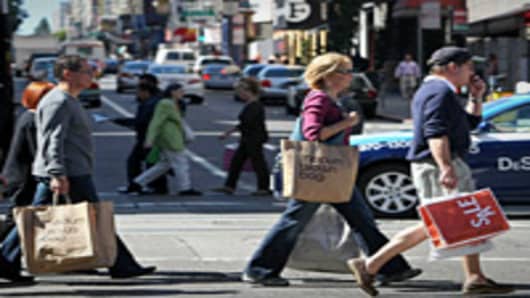The sharp decline in retail salesin May was enough to prompt some economists to trim their estimates for economic growth in the current quarter, but the jump in consumer confidence to a two-and-half-year high in Junesuggests that the weaker spending may be have only been temporary.
"We're going to see a good June, that was just a slow spot," said Jan Kniffen, CEO of J. Rogers Kniffen, a retail industry consulting group.
Kniffen said he expects consumers were retrenching over the past five weeks after having spent like "drunken sailors" in March and into Easter. The weather in early May also didn't help encourage seasonal shopping, especially for apparel. But Kniffen said he has seen evidence over the past three weeks that consumer spending has rebounded.
What's more, Kniffen is gathering some confidence from the spending that is going on among higher-income shoppers. The stock market's downward lurch in May could have given these shoppers plenty of reasons to put their spending on pause, but these shoppers kept buying, and sales of more discretionary items like electronics and meals in restaurants held up during the latest period.
Richard Hastings, a macro and consumer strategist at Global Hunter Securities, also said he expects latest retail sales report is "a one-month anamoly."
"The lower-income consumer has a lot of problems, the rest of it— middle income and up—those percentiles are in ok-to-good shape," Hastings said.
Digging into the numbers, there are signs that the 1.2 percent decline was very narrowly concentrated in autos, gasoline and building materials, said Nomura Securities Chief Economist David Resler, in a research note. And, he notes, in some cases the declines represents lower prices rather than fewer consumers making purchases.
"We believe the report was much more positive than the headline figures suggest," Resler said.
For example, gasoline station sales fell by 3.3 percent from April, reflecting a sharp decline in gasolines prices.
Spending on building materials fell 9.3 percent, but Nomura points out that sales in this category have been very robust over the past two months. In fact, the decline in building material sales may have more to do with the surge in home sales that was inspired by the government's housing tax credit, which expired at the end of April.
Still, some economists had hoped that the boost in building material spending would linger a little while after the housing tax credit disappeared as it often takes some time to get settled into a new home.
If autos sales, gas and building materials are stripped out of the headline number, core retail sales actually rose 0.1 percent from last month.
Still, that number was lower than many economists, including Nomura expected, and the firm did lower its second-quarter estimate for the nation's gross domestic product by 0.1 percent to an increase of 3.1 percent from the first quarter, after the retail sales report was released. But the trend remains positive.
"Overall recent retail sales reports show a cooling in consumer spending growth from the first qurater, but not an outright retrenchment," Resler said.
The retail industry trade group, the National Retail Federation, said the report was a reminder that there is still "uncertainty" in the economy.
"Even though May sales were not as strong as previous months, we remain encouraged by the steady pace of the economic recovery," said Rosalind Wells, chief economist for the NRF.
The details of the core retail sales were mixed, with more descretionary areas like furniture, sporting goods, hobby, book and music sales, and electronic and appliance store sales up, while apparel and general merchandise sales declined.
Capital Economics U.S. Economist Paul Dales said he expects the decline in retail sales is a "temporary blip" rather than a "renewed downturn stemming from the fiscal crisis in Europe."
That's because, if the European debt crisis dealt a blow to consumer confidence it would have already shown up in the consumer confidence survey, Dales said. That did not happen, in fact the University of Michigan measure rose to 75.5 in June from 73.6 in May.
That said, even if sales rebound in June, it appears that real consumption in the second quarter will be lower than it was in the first quarter.
"Overall, these figures are a reminder that the household sector is in no shape to become the engine of growth once again," Dales said in a research note. "But equally it seems unlikely that the events in Europe will knock the US economic recovery significantly off course."
More from Consumer Nation:
- Oil Spill's Latest Victim: Nation's Oldest Oyster Shucker
- Americans Serious About Improving Finances: Advisers
- iPad Sparks New Way for Retailers to Advertise
- All Abroad: Retailers Head Overseas to Boost Growth
Questions? Comments? Email us at consumernation@cnbc.com



